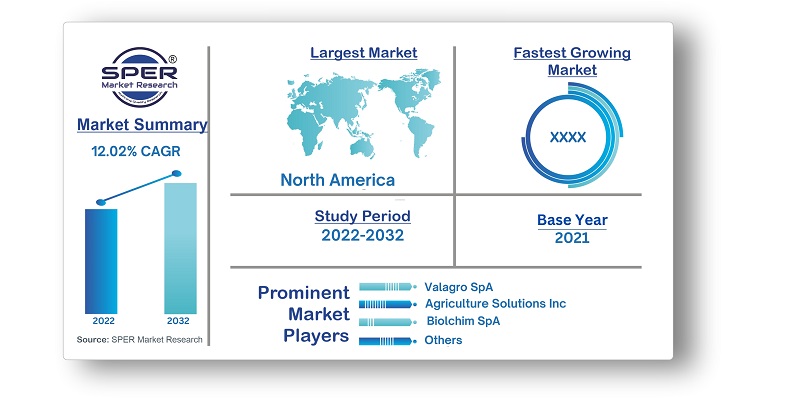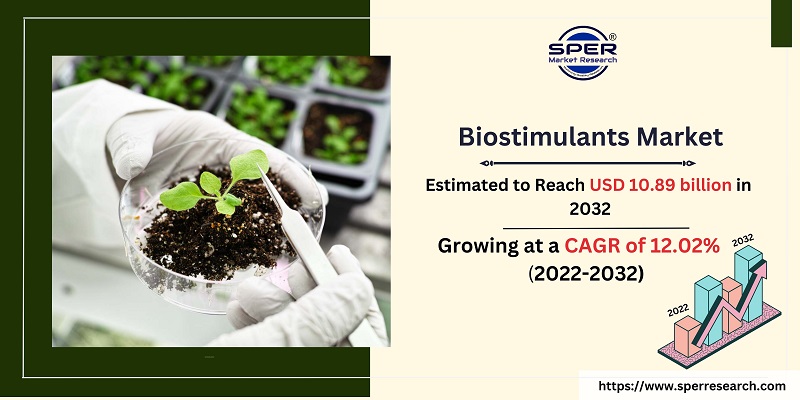
Biostimulants Market Growth, Share, Size, Trends, Scope, Challenges and Future Opportunities 2032
Biostimulants Market Size- By Active Ingredient, By Application, By Crop Type, By Formulation- Regional Outlook, Competitive Strategies and Segment Forecast to 2032
| Published: Mar-2023 | Report ID: AGRI2315 | Pages: 1 - 244 | Formats*: |
| Category : Agriculture | |||


| Report Metric | Details |
| Market size available for years | 2019-2032 |
| Base year considered | 2021 |
| Forecast period | 2022-2032 |
| Segments covered | By Active Ingredient, By Application, By Crop Type, By Formulation |
| Regions covered | Asia Pacific, Europe, Middle East and Africa, North America, Latin America |
| Companies Covered | Valagro SpA, Sapec Agro S.A., Platform Specialty Products Corp., Novozymes A/S, Koppert B.V., Italpollina SAP, Isagro Group, Biostadt India Ltd., Biolchim SpA, BASF SE, Hello Nature, Lallemand, Agriculture Solutions Inc. |
- Biostimulants material suppliers
- Biostimulants manufacturers
- Intermediate suppliers, such as traders and distributors of biostimulants
- Manufacturers of food & beverages, raw material suppliers and distributors
- Government and research organizations
- Amino Acid
- Humic Substances
- Microbial Amendments
- Seaweed Extracts
- Foliar treatment
- Seed treatment
- Soil treatment
- Cereals & Grains
- Fruits & Vegetables
- Oil Seeds & Pulses
- Others
- Dry
- Liquid
- Asia-Pacific
- Europe
- Middle East & Africa
- North America
- Latin America
- Size of Global Biostimulants Market (FY’2019-FY’2032)
- Overview of Global Biostimulants Market
- Segmentation of Global Biostimulants Market By Active Ingredient (Amino Acid, Humic Substances, Microbial Amendments, Seaweed Extracts, Others)
- Segmentation of Global Biostimulants Market By Application (Foliar treatment, Seed treatment, Soil treatment, Others)
- Segmentation of Global Biostimulants Market By Crop Type (Cereals & Grains, Fruits & Vegetables, Oil Seeds & Pulses, Others)
- Segmentation of Global Biostimulants Market By Formulations (Dry, Liquid)
- Statistical Snap of Global Biostimulants Market
- Growth Analysis of Global Biostimulants Market
- Problems and Challenges in Global Biostimulants Market
- Competitive Landscape in the Global Biostimulants Market
- Impact of COVID-19 and Demonetization on Global Biostimulants Market
- Details on Recent Investment in Global Biostimulants Market
- Competitive Analysis of Global Biostimulants Market
- Major Players in the Global Biostimulants Market
- SWOT Analysis of Global Biostimulants Market
- Global Biostimulants Market Future Outlook and Projections (FY’2019-FY’2032)
- Recommendations from Analyst
1.1. Scope of the report1.2. Market segment analysis
2.1 Research data source2.1.1 Secondary data2.1.2 Primary data2.1.3 SPER’s internal database2.1.4 Premium insight from KOL’s2.2 Market size estimation2.2.1 Top-down and Bottom-up approach2.3 Data triangulation
4.1. Driver, Restraint, Opportunity and Challenges analysis4.1.1 Drivers4.1.2 Restraints4.1.3 Opportunities4.1.4 Challenges4.2. COVID-19 Impacts of the Global Biostimulants Market
5.1. SWOT analysis5.1.1 Strengths5.1.2 Weaknesses5.1.3 Opportunities5.1.4 Threats5.2. PESTEL analysis5.2.1 Political landscape5.2.2 Economic landscape5.2.3 Social landscape5.2.4 Technological landscape5.2.5 Environmental landscape5.2.6 Legal landscape5.3. PORTER’S five forces analysis5.3.1 Bargaining power of suppliers5.3.2 Bargaining power of Buyers5.3.3 Threat of Substitute5.3.4 Threat of new entrant5.3.5 Competitive rivalry5.4. Heat map analysis
6.1 Global Biostimulants Manufacturing Base Distribution, Sales Area, Product Type6.2 Mergers & Acquisitions, Partnerships, Product Launch, and Collaboration in Global Biostimulants Market
7.1 Amino Acid7.2 Humic Substances7.3 Microbial Amendments7.4 Seaweed Extracts7.5 Others
8.1 Foliar treatment8.2 Seed treatment8.3 Soil treatment8.4 Others
9.1 Cereals & Grains9.1.1 Corn9.1.2 Wheat9.1.3 Rice9.2 Fruits & Vegetables9.2.1 Pome Fruit9.2.2 Citrus Fruit9.2.3 Berries9.2.4 Root and Tuber Vegetable9.2.5 Leafy Vegetable9.3 Oil Seeds & Pulses9.3.1 Soybean9.3.2 Sunflower9.4 Others
10.1 Dry10.2 Liquid
11.1 Global Biostimulants Market Size and Market Share by Region (2019-2025)11.2 Global Biostimulants Market Size and Market Share by Region (2026-2032)11.3 Asia-Pacific11.3.1 Australia11.3.2 China11.3.3 India11.3.4 Japan11.3.5 South Korea11.3.6 Rest of Asia-Pacific11.4 Europe11.4.1 France11.4.2 Germany11.4.3 Italy11.4.4 Spain11.4.5 United Kingdom11.4.6 Rest of Europe11.5 Middle East and Africa11.5.1 Kingdom of Saudi Arabia11.5.2 United Arab Emirates11.5.3 Rest of Middle East & Africa11.6 North America11.6.1 Canada11.6.2 Mexico11.6.3 United States11.7 Latin America11.7.1 Argentina11.7.2 Brazil11.7.3 Rest of Latin America
12.1 Valagro SpA12.1.1 Company details12.1.2 Financial outlook12.1.3 Product summary12.1.4 Recent developments12.2 Sapec Agro S.A.12.2.1 Company details12.2.2 Financial outlook12.2.3 Product summary12.2.4 Recent developments12.3 Platform Specialty Products Corp.12.3.1 Company details12.3.2 Financial outlook12.3.3 Product summary12.3.4 Recent developments12.4 Novozymes A/S12.4.1 Company details12.4.2 Financial outlook12.4.3 Product summary12.4.4 Recent developments12.5 Koppert B.V.12.5.1 Company details12.5.2 Financial outlook12.5.3 Product summary12.5.4 Recent developments12.6 Italpollina SAP12.6.1 Company details12.6.2 Financial outlook12.6.3 Product summary12.6.4 Recent developments12.7 Isagro Group12.7.1 Company details12.7.2 Financial outlook12.7.3 Product summary12.7.4 Recent developments12.8 Biostadt India Ltd.12.8.1 Company details12.8.2 Financial outlook12.8.3 Product summary12.8.4 Recent developments12.9 Biolchim SpA12.9.1 Company details12.9.2 Financial outlook12.9.3 Product summary12.9.4 Recent developments12.10 BASF SE12.10.1 Company details12.10.2 Financial outlook12.10.3 Product summary12.10.4 Recent developments12.11 Hello Nature12.11.1 Company details12.11.2 Financial outlook12.11.3 Product summary12.11.4 Recent developments12.12 Lallemand12.12.1 Company details12.12.2 Financial outlook12.12.3 Product summary12.12.4 Recent developments12.13 Agriculture Solutions Inc.12.13.1 Company details12.13.2 Financial outlook12.13.3 Product summary12.13.4 Recent developments
SPER Market Research’s methodology uses great emphasis on primary research to ensure that the market intelligence insights are up to date, reliable and accurate. Primary interviews are done with players involved in each phase of a supply chain to analyze the market forecasting. The secondary research method is used to help you fully understand how the future markets and the spending patterns look likes.
The report is based on in-depth qualitative and quantitative analysis of the Product Market. The quantitative analysis involves the application of various projection and sampling techniques. The qualitative analysis involves primary interviews, surveys, and vendor briefings. The data gathered as a result of these processes are validated through experts opinion. Our research methodology entails an ideal mixture of primary and secondary initiatives.



Frequently Asked Questions About This Report
PLACE AN ORDER
Year End Discount
Sample Report
Pre-Purchase Inquiry
NEED CUSTOMIZATION?
Request CustomizationCALL OR EMAIL US
100% Secure Payment






Related Reports
Our Global Clients
Our data-driven insights have influenced the strategy of 200+ reputed companies across the globe.




















